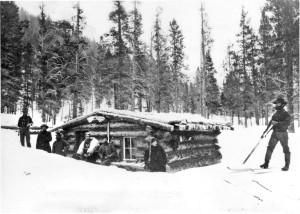By John Mattingly
On Nov. 11 we observed Veterans Day, again lavishing praise and gratitude on our veterans. However, the Nov. 11 holiday originated as Armistice Day, a day commemorating peace at the end of WWI.
The European Allies met in Compeigne France in 1918 to sign an armistice with Germany that ended WWI, the “war to end all wars” that left over 20 million dead. Armistice Day was observed with an hour of silence on the eleventh hour of the eleventh day of the eleventh month.
The first Armistice Day in the U.S. was Nov. 11, 1919 following a proclamation by Woodrow Wilson citing the day as an “opportunity given America to show her sympathy with peace and justice in the council of nations.” In 1938, the U.S. Congress made Armistice Day a national holiday.
At the end of WWII, however, the mood of the victorious Allies shifted toward an emphasis on warriors rather than peace, as the world became a perpetually dangerous place. In 1954, Eisenhower signed HR7786, officially changing Armistice Day to Veterans Day.
WWI vets from the U.S., it should be noted, did not receive any federal assistance on their return to the States: no VA medical care, no GI Bill, not even returning pay. Collective guilt over the neglect of WWI vets, together with the large population of WWII vets returning from a heroic victory, combined to give Eisenhower the political capital and moral authority to replace a national day honoring peace with a day honoring warriors.
Abandoning Armistice Day proved deeper than a name change. After WWII, the U.S. formed a Department of Defense to replace the Department of War – a change prompted by the Cold War with Russia. Instead of mobilizing for war when war broke out, the U.S. became a nation ready to go to war, a readiness that became almost prophetic, as the combination of weapons and warriors made engagement inevitable. Eisenhower saw the trend by the end of his administration, calling out the dangers of the “Military Industrial Complex” when he left office in 1960.
Abandoning Armistice Day supplemented Memorial Day as a national holiday commemorating warriors. Memorial Day, or Decoration Day, became a national holiday in 1868 after the end of the Civil War. Two national holidays commemorating veterans proved compatible with the evolving change in U.S. policy toward the dynamics of world conflict. The end of Armistice Day marked the end of being committed to peace. From Korea to the Cold War, to the Vietnam War to Bosnia and Kosovo, to Grenada and various “police actions,” and finally to the ongoing wars in the Middle East, U.S. citizens have been forced to be at peace with being at war. Honoring veterans instead of peace became a necessary and logical part of that mentality.
[InContentAdTwo]
But ironies abound. While WWII was fought against a raging tyrant, the wars the U.S. has engaged in since abandoning Armistice Day have not been just or successful. Vietnam is now acknowledged – even by McNamara, who steered it into a major war – as having been motivated by the mistaken Domino Theory, a “mistake” that took the lives of over 50,000 veterans and left many more disabled and diminished.
The Gulf War was perhaps the only war since WWII that was strategically successful but politically unsatisfying. The bad guy got away, issuing arrogant threats at us through the black smoke of the burning oil wells in his wake. Poppy Bush lost the 1992 election, in part because the Gulf War lacked the trappings of what Americans thought of as “victory.”
The most recent wars in the Middle East have, in the judgment of both the GAO and top U.S. generals, “failed to achieve any U.S. military objectives.” In other words, even though we may have won tactical battles, we lost the war. Instead of bringing peace and liberation, we brought chaos and opened the door for ISIL. We lost for many strategic reasons, including under-estimation of the enemy and total lack of understanding of the enemy, thus repeating the mistake of Vietnam by willfully stepping into the middle of a sectarian civil war in which we were not stakeholders.
There really wasn’t any territory or resource the U.S. wanted to acquire in the Middle East. We didn’t want our citizens to occupy Iraq or Afghanistan, and even the oil resource in the region escaped our control. The stated objective of killing terrorists with superpower tactics clearly backfired, creating more terrorists with every campaign, terrorists willing to engage us in asymmetrical suicidal conflicts masterminded by raging religious tyrants where formerly there were only a few middling dictators.
“Spreading freedom and democracy” was never a comprehensible military mission for a warrior. A warrior knows how to take a hill or kill an enemy, not persuade a warlord to give his women the right to vote. Suggesting that the Middle East wars were engaged to protect our freedoms at home now seems like a cruel joke, as oppressive layers of homeland security are encroaching on all aspects of our lives. The recent attacks in Paris and threats of homeland attacks have already put “boots on the ground” in many major U.S. cities: the boots of U.S. police and U.S. military personnel, giving our streets the appearance of a war zone.
The change in U.S. policy toward perpetual war can be traced back to the death of Armistice Day. The resulting need for us to “be at peace with being at war” now includes a need to honor and reabsorb veterans into our culture and economy regardless of their battlefield integrity or their strategic success. This is a problem.
Curiously, it’s almost as hard to know how to deal honestly with returning veterans these days as it is to be honest about how to deal with ISIL. Nobody really knows the best approach to either. Citizens who’ve had no real military experience in the last ten to fifty years have easy answers: express gratitude and lavish honor upon our vets, leaving out accountability for the casualties, the wasted money, the wasted time and the horrific moral breaches executed by the veterans, such as torture, Abu Ghraib and the bombing of a hospital, to mention a few.
Politicians who are not in office have similarly easy solutions – without accountability to get ISIL: destroy them with bombs, coalitions and above all, “leadership,” leaving out the fact that this is already being done, that leadership is more than chest pounding, and that this “strategy of leadership” must be active for the next twenty or thirty or maybe even fifty years. Face it, terrorists are a wet dream for the Military Industrial Complex and the Homeland Security budget busters, because the war on terror never ends.
It’s almost dangerous these days to assert that the veterans of the Middle East wars are not heroes, not our brightest and best, and not worthy of honor or preferred compensation. They were the human part of a war that resulted in actions that, by the standards set by the U.S. at Nuremberg after WWII, would be war crimes. Yet we want to give our military so much credit where credit is not due. This uncritical, unthinking worship of the military is dangerous.
It’s also dangerous these days to suggest that there really is no way to protect against an enemy willing to engage in asymmetrical suicidal warfare. It might even be dangerous to remind our U.S. military that the American Revolution was won by colonists using asymmetrical battlefield tactics. The British military fought in rigid formation, with strict rules of engagement. The colonists shot from behind trees. Today, it is the U.S. military that has become rigid, fighting in the outdated superpower formations, leaving itself open to terrorists.
Giving our U.S. military uncritical praise while promoting the notion that we can be protected against ISIL is a dangerous and related combination. It isn’t ridiculous to predict a situation in the future when the U.S. is attacked and the politicians can’t muster enough “leadership,” so our citizens demand that the military take over for the sake of our national security. It’s already happening.
With this column, I hope to suggest that the first step in the long journey to reversing the zeitgeist of being at peace with being at war, and the first step toward getting real about our military, our vets and the actual risks presented by terrorism, is to restore Armistice Day. Bring back a day commemorating what we all really hope for: peace.
John Mattingly cultivates prose, among other things, and was most recently seen near Poncha Springs.



